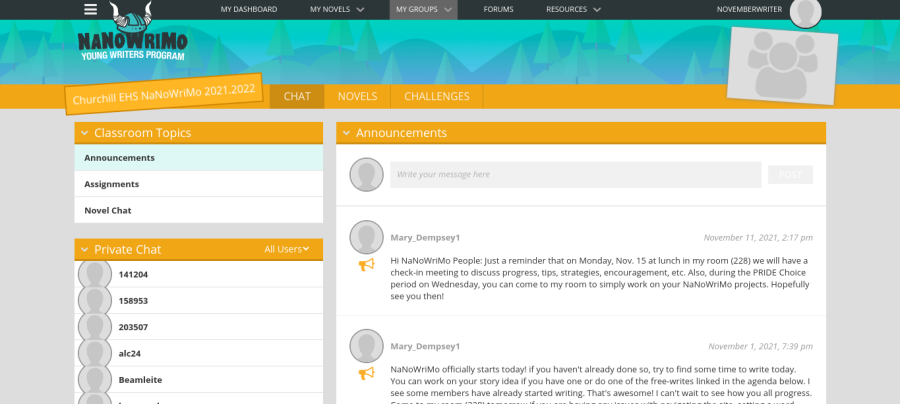Students celebrate writing with national competition
During November 2021, the WCHS NaNoWriMo classroom met 52 percent of its original goal. That was still more than one-quarter of a million words.
January 2, 2022
Every November, thousands of school-aged writers log onto their computers, typing up stories about their hopes, dreams and inner thoughts. At the end of every day, they enter their word counts into the website for a competition, encouraging students to write.
NaNoWriMo, an acronym for National Novel Writing Month, is held every November as a forum for creative writing. The Young Writers Program (YWP) focuses on children under 17, as well as 18-year-olds still in high school, allowing them to sign up for the online classroom to share their work and progress. The English Honor Society (EHS) has had a classroom since at least 2012, but this was the first year it was expanded to the entire WCHS community.
“I wrote about my dreams because I have many of them,” junior Jessica Fang said. “I can also notice parts of my real life seep in, but also just a lot of weird things that I find really interesting. There was this thing, where you could get wings if your DNA was in the right sequence, but sometimes you didn’t have wings, so you had to reset your DNA and have wings.”
Fang was a first-time participant in NaNoWriMo this year. As a member of EHS, she was interested in participating because it gave her a chance to write about her thoughts.
Senior Clara Goldberg, another member of the EHS, was a returning NaNoWriMo participant. She found this year’s competition different from 2020 when she had more free time because of virtual school and other factors. However, getting to sit down and write and being motivated by reaching her goal, was exciting to her.
“I love to write and I’ve been writing ever since I was a really little kid,” Goldberg said. “My goal in life is to become an author, so, for me, NaNoWriMo is really like fun practice for writing books. Also I just had a lot of ideas and I thought it would be fun to write.”
She noticed that this competition allows for more creative freedom than writing for school, which often comes with restrictions on topic and number of words. In her story, she focused on how little decisions alter realities, sometimes forming new ones. Goldberg also aims to increase representation in literature by showcasing LGBTQ+ characters, an important issue to her.
“I try to represent as many identities as I can, not just my own, so that people can feel seen in the work,” Goldberg said. “For me, I always grew up searching for representation. It was not given to me, I had to look for it. And I think it’s important for the future to form an ability to be able to just see yourself in all books.”
Fang wrote her story during the free time she had in school. Her original goal was to hit the 5,000 words mark, but she ended up exceeding her expectations, writing over 6,000 by the end of the month.
WCHS participants made a classroom on the NaNoWriMo website, which gave them the opportunity to offer each other motivation, advice and tips. Additionally, it allowed Fang to see everyone else’s progress, and vice versa, which inspired her to keep going.
“Find a private place to write a bunch or use different apps, like one that locks your computer,” Fang said. “It was sort of fun. You got to see how other people delt with the challenge and how what they wrote for what for their projects.”
According to Riley Bartlebaugh, an English teacher who helped run NaNoWriMo, the competition will continue for all students who want to participate next year. The competition provides students with an opportunity to improve their writing.
“I’m really proud of my idea and what I was able to get down; I do hope to continue it after this month,” Goldberg said. “My biggest takeaway is all writing is good writing. Don’t over edit yourself. Don’t overthink things and go back and change them because what you write down is good and you should be proud of it, simply for doing it.”


